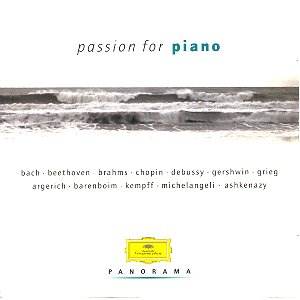PASSION FOR PIANO
Works by Albéniz, Bach, Balakirev, Bartók, Beethoven, Brahms,
Chopin, Debussy, Gershwin, Gottschalk, Granados, Grieg and
Handel.
 Martha Argerich, Vladimir
Ashkenazy, Daniel Barenboim, Arturo Benedetti Michelangeli, Shura Cherkassky,
Ivan Davis, Andor Foldes, Andrei Gavrilov, Emil Gilels, Werner Haas, Julius
Katchen, Wilhelm Kempff, Zoltán Kocsis, Alicia de Larrocha, John Lill,
Jean-Marc Luisada, Roberto Szidon, Rosalyn Tureck and Alexis Weissenberg.
Martha Argerich, Vladimir
Ashkenazy, Daniel Barenboim, Arturo Benedetti Michelangeli, Shura Cherkassky,
Ivan Davis, Andor Foldes, Andrei Gavrilov, Emil Gilels, Werner Haas, Julius
Katchen, Wilhelm Kempff, Zoltán Kocsis, Alicia de Larrocha, John Lill,
Jean-Marc Luisada, Roberto Szidon, Rosalyn Tureck and Alexis Weissenberg.
 Panorama 469 232-2
[AAD, ADD, DDD] [two discs] [156'41] Recorded 1955-92.
Panorama 469 232-2
[AAD, ADD, DDD] [two discs] [156'41] Recorded 1955-92.
Crotchet
Amazon
UK
AmazonUS

A title like 'Passion for Piano' promises all the worst from the World of
the compilation album. This set (which could perhaps be more accurately titled
the 'A-H of Passion for the Piano': composers range from Albéniz to
Handel), on paper a semi-random hotch-potch, in fact throws up some interesting
pianistic comparisons. Thus Larrocha's extract from Albéniz's
Iberia, full of virtuoso panache wedded with tenderness when necessary,
puts Cherkassky's account of the same composer's Tango Op. 165 No.
2 (arranged by Godowsky) fully into the shade.
Tureck and Kempff in Bach are more evenly matched, the contrast here being
one of approach. Tureck's Aria from the Goldberg Variations is beautifully
restful, while Kempff's brisk C major Prelude and Fugue from Book 1 of the
Well-Tempered Clavier comes from an earlier world. Kempff appears again in
Brahms (the E flat Intermezzo, Op. 117 No. 1), and here it is he who eclipses
John Lill pounding his way through the B minor Capriccio, Op. 76 No.
2.
Debussy's music has elicited a multitude of responses from its interpreters.
Here it is instructional to compare and contrast Weissenberg's readings with
those of Michelangeli. Weissenberg is arguably the more atmospheric of the
two, Michelangeli the more perfect and sculptured, the perfectly weighted
opening chords of his Cathédrale engloutie beginning an account
that effectively silences criticism.
Chopin, appropriately, is honoured with a five-fold response: Ashkenazy,
Szidon, Luisada, Barenboim and Argerich. Perhaps to begin with a selection
of Ashkenazy's mid-seventies studies was a mistake, the hard, percussive
touch and recorded sound working hand in hand against Chopin's intentions.
The 'Revolutionary' certainly needs more full-blooded treatment. Szidon's
Fantaisie-Impromptu is from another world, one in which the interpreter
is infinitely more attuned to Chopin's output. Szidon plays with a Bolet-like
sound and lovely filigree when required. Barenboim's Nocturne Op. 9 No. 2
is on the clangy side, so it is left to Argerich and Luisada to reintroduce
the Chopin we know and love. Argerich's thunderous, full-blooded approach
needs little introduction (her A flat Polonaise, Op. 53 is awe-inspiring).
The Tunisian Jean-Marc Luisada, however, provides a pleasant surprise with
three characterful Waltzes.
There are surprises elsewhere in the collection. Larrocha and Handel (Harmonious
Blacksmith Variations) seem unlikely bedfellows, but the strength of Larrocha's
convictions carries her through. Kempff has the strength of personality to
bring off Beethoven's G major Rondo, Op. 51 No. 1. But the highlight of the
set is Julius Katchen's awe-inspiring Islamey. He makes light of the
difficulties, his masterly use of pedal and in particular his sparkling arpeggios
providing an object lesson in interpretation and technique.
In amongst all these pianists, there is space also for the unremarkable:
Werner Haas' account of Gershwin's Three Preludes might make reliable
library recordings, but hardly enter Gershwin's world. The most adventurous
music here is probably Bartók's Romanian Folk Dances, Sz56,
persuasively presented by Kocsis.
Destined by its very nature to be a mixed bag, this two-disc set ended up
being more stimulating than one might have originally thought. And that's
no bad thing.
Reviewer
Colin Clarke


